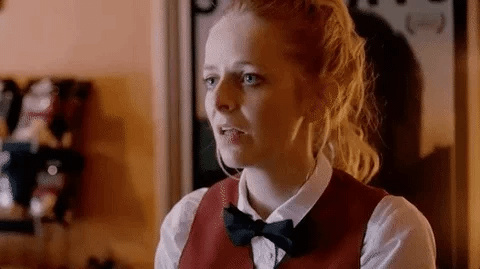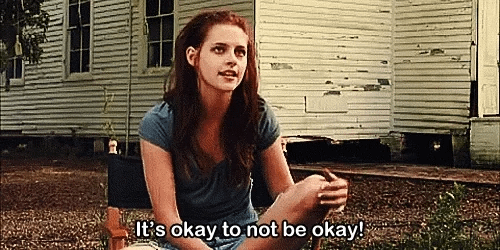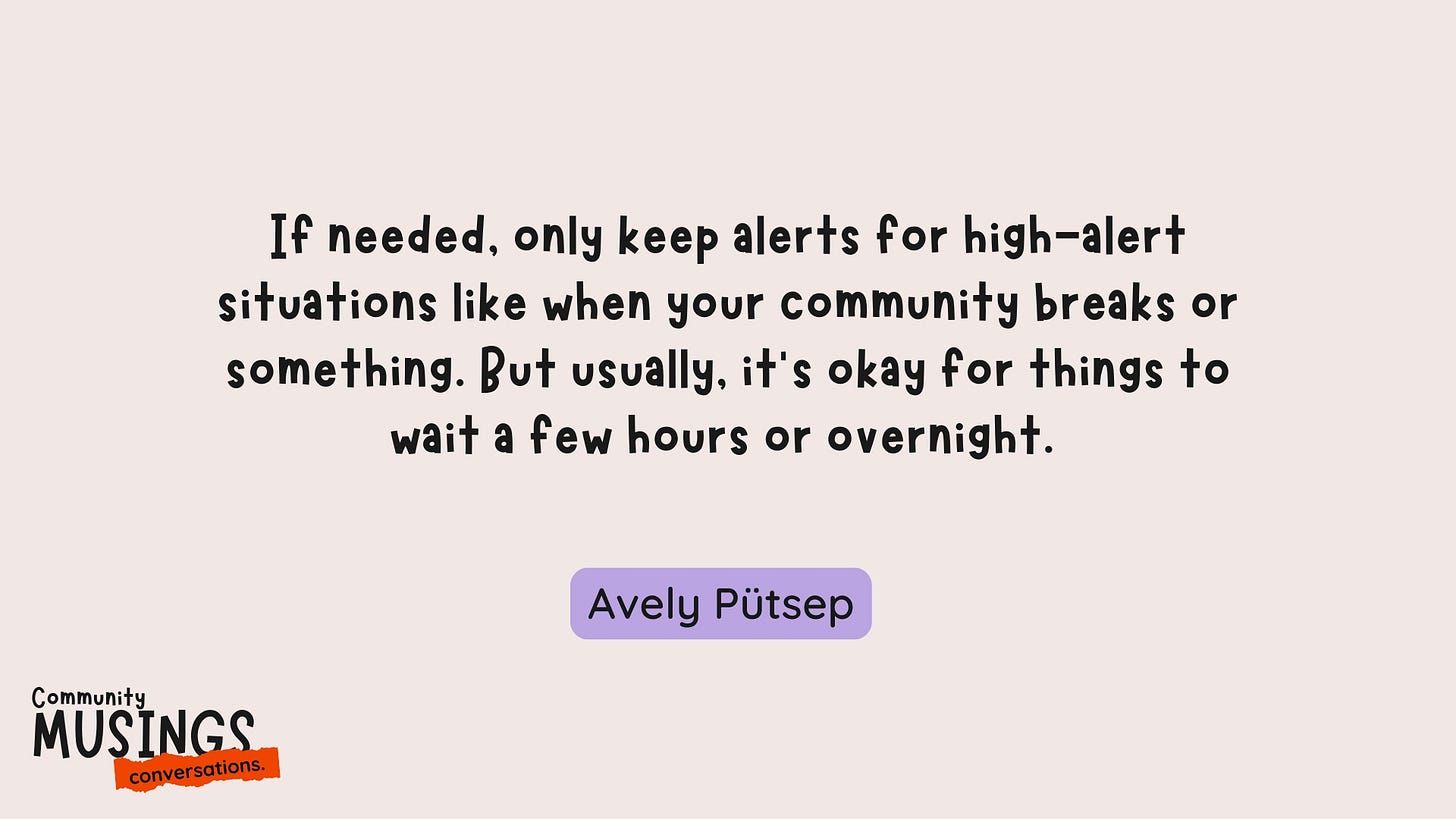Community Managers are Humans Not Superhumans...
Musings with Avely Pütsep, Community and Socials Lead at Remote Daily
Behind every thriving community is a a human with emotions and things to deal with. This is Community Musings: Conversations. — a series dedicated to navigating the mental and emotional rollercoaster of building a career in community.
Meet Avely Pütsep!
At the beginning of the year, I opened up my calendar to chat and connect with other community managers, and one of the amazing people I connected with is Avely. She is a very lovely person and we are both suckers for organic growth! She is doing incredible work in the community space- organizing wholesome community events, sharing wholesome content, and doing the things she loves alongside being a community leader. We got to talk about her journey into community management, her experience with low days and job hunting, and the two things that keeps her going as she builds.
Here is her story!
I’m always happy to share my experience or stories because if it can help even one community person in any way then of course I’m happy.
Avely: So many of us community managers somehow stumbled into community management or at one point realized “Oh I think I’m a community manager, how did this happen?”. And my story is that I’ve been working in organic social media marketing for like nine years; this means that I don’t do any paid marketing like Meta or Google Ads or anything like that, I’m fully on the organic side which is storytelling and making connections with people.
A few years back I was working with a climate startup- doing social media and lots of other things as well because that’s how it often goes in startups that you do many different things. The startup had been around for maybe two years then and it was very mission-driven, so we had a lot of people around the company - clients, super fans who really liked what the company did, some friends of employees who were becoming super fans or clients - and we realized that we needed a way to communicate with them that was two-sided. A lot of times we see companies communicate with people more in an audience way which is quite one-sided, but we wanted to a way that our communication would be two-sided. We realized that we needed a community and the CEO called me and was like “Hey Avely, I think you should do our community. What do you think?” I remember that I was very open to it because I was somewhat already doing it, of course not in a very strategic and thought-out way. So, I said “Yes, as long as you understand that I don’t have community-specific experience. Like I don’t know what I’m doing if that’s okay for you.” Secondly, “as long as the community isn’t a sales channel. If these two things work for you then yes of course let’s build this community.”
So, that’s the first time that I actually started community building specifically and that was my first role even though I built communities before that without knowing that I was doing it.
Job hunting can take over your life completely and so I’d recommend that you live your life.
Avely: I’ve had two different times when it took me a few months or longer to find a new job and the last time was a few years back when when I was laid off from a startup because of the economy and many startups were struggling. It was definitely very hard and there were a lot of negative feelings and I lost confidence.
The first time I had to job hunt was harder than the second time because I was younger, less experienced, and also had less confidence to start with. But I remember that at the beginning of the job search, I was of course more eager and pumped up and sure that I would find my place in the work scene. The job search took a while; I had done job interviews at different stages but I hadn’t secured any offers or an actual job. My confidence got lower and lower and lower to the point where I saw an internship in a company that I really liked, and I applied for it. They got back to me saying they really liked my experience and how I carried myself but the hiring manager plain out said “What are you doing applying to this position? You are overqualified, you are not an intern…” It was so kind of her to say that because it was a wake-up call that I needed because it reminded me that I am good at what I do. I didn’t get that internship because they didn’t give it to me but after that, I started applying to positions that were in line with my experience and a few months later, I got a role.
The second time wasn’t that long. I first took a few months off and when I did start applying, it only took me a month to find a new role which I’m incredibly happy with.
One of my biggest learning from those times is that job hunting can take over your life completely and so I’d recommend that you live your life. It’s very easy to scroll through job ads all the time, check if you have gotten any responses, and be available for any questions interviews, or tasks, but it can also get very overwhelming. I saw a LinkedIn post once about how job hunting is like a full-time job itself.
Try to put specific times to when you’re searching for jobs and when you are not, schedule some walks or time with friends because when you’re job hunting, you have so much free time. Try to enjoy actually having some time to do the things that you enjoy.
I don’t even know why but I feel like as Community builders we look at ourselves as ‘super-humans’ and set ‘super-human’ expectations for ourselves.
Avely: We put on these crazy expectations when in real life you shouldn’t expect to be super on top of things, ‘cause we all have our highs and lows.
One thing that helps with showing up on the low days is to be organized with your work. Have a content calendar for what happens in the community on different days of the week because then you don’t have to start thinking from scratch about what you have to do. If you have to go to your community every morning and start thinking about what questions to ask or what kind of games to play, of course, it would be hard, especially on days when you don’t feel like you have a lot to give.
Another way you can navigate these low days is to switch your day around. You don’t have to be super active in the community and do all the big things - especially because everything these days feels like a big thing, even having conversations with your community is a big thing- you can switch it around and take more of a chill calm day and rest a bit.
The third thing I would recommend is to just be honest and vulnerable with your community members. This of course depends on the kind of community that you manage.
I used to be great at finishing work at a certain time in the evening and not checking anything in the evenings and weekends but this has flown out the window.
Avely: I don't know of any study researching mental health and burnout in the community profession, but my guess is the numbers would be sad.
Keeping all notifications off is my best work boundary; I did it a few years ago and I'm not going back. If you have your notification on, you'll be sucked into work, and the work never stops. You need to stop. If needed, for starters, only keep alerts on for high-alert situations when your community breaks or something. But usually, it's okay for things to wait a few hours or overnight.
Other than that, to be completely honest, my boundaries have blurred and I used to be better at them. This is also important to talk about because it's a shared experience with community folks. I used to be great at finishing work at a certain time in the evening and not checking anything in the evenings and weekends but this has flown out the window. But I'm working to get back to it, it's soooo good for my mental health!
I also used to be better at realizing I can't help all community members and I'm not supposed to. Put systems in place so they help themselves- often other members help too, and you help some yourself - but it is not your responsibility to help every single person.
I recommend everyone to have their own little "praise box"
Avely: Imposter syndrome wreaks havoc in the community space, and it's especially prominent in women. That doesn't mean it's not an issue for men and non-binary, but throughout history, it has most affected women.
A great reminder regarding self-doubt is what one of my community friends just said in our chat. He said he'd been doubting himself, but then he looked at the evidence and realized what it said. All of us have indicators that say our self-doubt and imposter syndrome are just in our heads! - Client testimonials, the fact your clients have stayed with you or keep coming back, internal feedback, community feedback, being highlighted by other community folks, being invited to do talks, etc.. - Just look at the evidence.
And I recommend everyone to have their own little "praise box". Save the feedback you get into one place, so when you do have a moment or pattern of self-doubt, you can go look at the evidence against it.
I have two things that always works for me whenever I am faced with any challenge
Avely: Go back to the beginning and look at what the goal of your community is, both for community and business. We can lose focus, so it's important to have this very clearly written out as a reminder. It's a reminder for myself too, I'm going to look at it now haha!
Then, honesty. Stay real and authentic. At the end of the day, your community members are real people with real feelings. If you start giving promises you can't keep or pushing engagement that's just for numbers without depth, the community will go into a sad state.
Connect with Avely Pütsep on LinkedIn
—
*Editor’s note: This interview has been edited for clarity and length.
- Enjoyed this piece?
- Did something stand out to you?
- Yet to subscribe?





